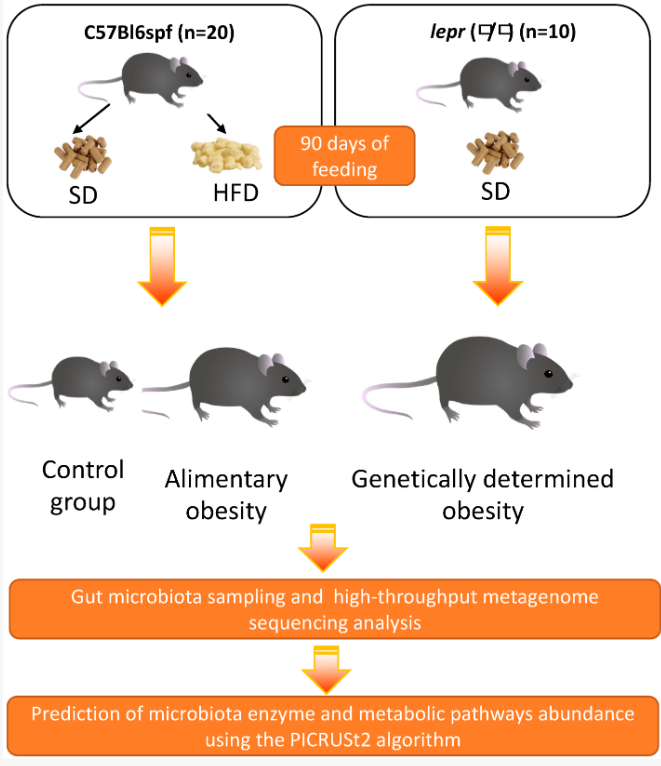Obesity is a growing global public health issue, linked to various metabolic abnormalities and diseases. The gut microbiota has been implicated in the regulation of obesity and related metabolic conditions, but its role in different degrees of obesity remains unclear. One aspect of this relationship is the association between obesity and decreased levels of vitamin B12 (cobalamin), an essential nutrient produced exclusively by microbes.
This study hypothesizes that the decrease in vitamin B12 levels observed in obese individuals may be partially due to reduced production by the gut microbiota. The aim of the study was to estimate the abundance of enzymes and metabolic pathways involved in vitamin B12 synthesis in the gut microbiota of mouse models with alimentary (diet-induced) and genetically determined obesity. This was done to evaluate the contribution of the obesogenic microbiome to vitamin B12 synthesis.
Methods
Mouse Models:
- C57BL/6SPF mice: Fed a high-fat diet (HFD) to induce obesity.
- db/db mice: Genetically modified to lack leptin receptors, leading to severe obesity and metabolic disturbances, fed a standard diet.
- Control C57BL/6SPF mice: Fed a standard diet.
Metagenome Sequencing:
- High-throughput metagenome sequencing was performed on gut microbiota samples from the mice.
Bioinformatic Analysis:
- Metabolic activity and pathways for vitamin B12 synthesis were reconstructed from the sequencing data.
- Comparative analysis was done between the different mouse groups to identify variations in the abundance of enzymes and pathways related to vitamin B12 synthesis.
Key Findings
Decreased Vitamin B12 Synthesis in Obese Mice:
- Both HFD-fed C57BL/6SPF mice and db/db mice showed a significantly lower predicted abundance of enzymes and metabolic pathways for vitamin B12 biosynthesis compared to non-obese control mice.
- This decrease was more pronounced in db/db mice, which exhibited severe obesity and greater metabolic disturbances.
Microbiota Composition and Enzyme Abundance Correlation:
- In HFD-fed mice, there were strong correlations between the abundance of enzymes involved in cobalamin synthesis and the representation of specific gut microbes.
- Notable negative correlations were observed with genera such as Colidextribacter, Akkermansia, Bacteroides, and Faecalibacterium.
- Positive correlations were found with genera such as Muribaculaceae, Enterococcus, Butyricoccus, and an uncultured genus of the Lachnospiraceae family.
Reduced Correlations in db/db Mice:
- In db/db mice, the correlation between gut microbes and the abundance of cobalamin biosynthetic enzymes was less pronounced.
- Only positive correlations were observed, primarily with the uncultured genus of the Lachnospiraceae family, indicating a distinct microbial community structure compared to HFD-fed mice.
Obesogenic Microbiota and Vitamin B12 Deficiency:
- The obesogenic microbiota appears to be depleted in vitamin B12-producing microbes, potentially leading to lower levels of vitamin B12 in the host.
- This depletion may contribute to the formation of an aberrant microbial community in obese mice.
Impact on Host Vitamin B12 Levels:
- The findings suggest that the degree of obesity and the associated changes in gut microbiota composition are key factors in the predicted abundance of vitamin B12 biosynthesis genes and pathways.
- These changes might make obese mice more prone to developing vitamin B12 deficiency.
The study provides evidence that severe obesity and corresponding metabolic disturbances are linked to a decrease in the representation of enzymes and pathways for vitamin B12 synthesis in the gut microbiota. This decrease is more significant in genetically obese db/db mice compared to diet-induced obese mice. The correlation between gut microbes and cobalamin biosynthetic enzyme abundance varies between different degrees of obesity. The findings imply that an obesogenic gut microbiota may contribute to decreased vitamin B12 synthesis in the gut, potentially influencing systemic cobalamin levels and increasing the risk of vitamin B12 deficiency in obese individuals.
Link to the given study : https://tinyurl.com/ycfwr6tj
